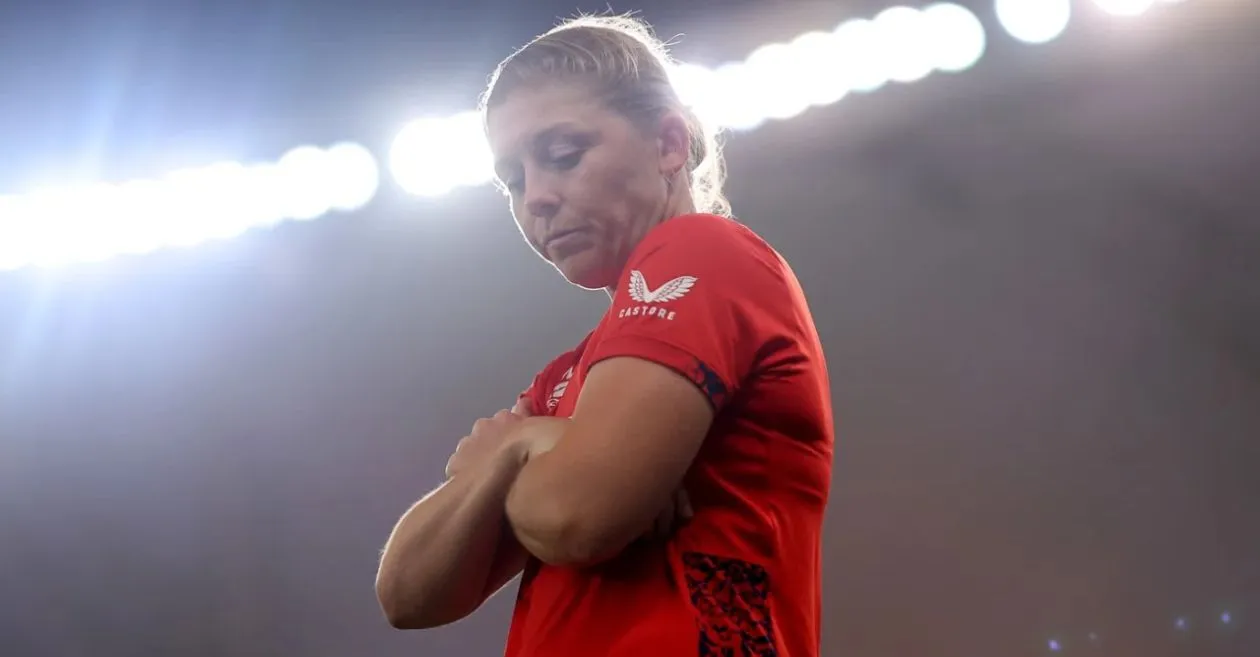The Women’s T20 World Cup 2024 was set to be a stage where England could reclaim their dominance in the format. With a star-studded lineup, strong performances in the group stage, and one of the most balanced teams in the tournament, expectations were high for Heather Knight’s side. Yet, in a shocking twist, England found themselves eliminated in the knockout stages after a stunning defeat to the West Indies. The 142-run chase by West Indies left England and their fans reeling, and analysts looking for answers.
England’s exit from the competition has triggered a wave of criticism and introspection, with many pointing to key areas where the team faltered. Here, we delve into the three critical reasons behind England’s unexpected downfall and explore how these factors collectively led to their surprising elimination.
Over-Reliance on Natalie Sciver-Brunt: A Dangerous Dependence
One of the most apparent weaknesses in England’s campaign was their over-reliance on star all-rounder Natalie Sciver-Brunt. A player of immense talent, Sciver-Brunt once again demonstrated her class, scoring a resilient 57 not out in the fateful match against the West Indies. Her ability to hold the innings together amidst a crumbling batting lineup was nothing short of remarkable. However, this also underscored England’s over-dependency on her to carry the team through tough situations.
Throughout the tournament, Sciver-Brunt’s performances were often the backbone of England’s batting efforts, but her solo brilliance was not enough to mask the failures of others. In the crucial match, the rest of the batting lineup faltered, with key players like Danielle Wyatt-Hodge and Maia Bouchier falling cheaply. This lack of collective contribution exposed a glaring weakness—England’s inability to fire as a cohesive batting unit when Sciver-Brunt wasn’t able to single-handedly save the day.
Such over-reliance on one player is always a double-edged sword in cricket. While having a superstar like Sciver-Brunt is a blessing, it becomes problematic when the team leans too heavily on her. When other batters fail to step up in critical moments, it creates a predictable dependency that opponents can exploit. Moving forward, England must address this imbalance and cultivate a batting order that is less reliant on individual brilliance and more capable of consistent collective performance.
Sloppy Fielding: A Silent Saboteur
Fielding is often the unsung hero in cricket, and in England’s case, it became their silent downfall. Despite their reputation for being a well-rounded and sharp fielding side, the team displayed uncharacteristic sloppiness in their quarterfinal match. Missed chances, dropped catches, and misfields plagued their performance, handing West Indies valuable scoring opportunities.
The most glaring example came when West Indies batter Qiana Joseph was dropped not once, but five times during the match. On top of that, West Indies captain Hayley Matthews, a key figure in their chase, was also given a reprieve with a dropped catch. Such costly mistakes allowed the opposition to keep their momentum alive and ultimately reach the target of 142 with relative ease.
Fielding is one of the few areas in cricket that is purely a matter of concentration and discipline. While dropped catches are part of the game, the frequency and ease with which England allowed West Indies to escape difficult situations indicated a deeper issue. It wasn’t just one or two players—it was a collective lapse in focus, and in a knockout match, such errors can prove fatal. England’s fielding woes directly contributed to their exit, as their inability to execute basic skills under pressure made all the difference in the final outcome.
Strategic Missteps: Inconsistent Plans and Execution
England’s defeat was not just a result of poor fielding or over-reliance on a single player; it was also rooted in deeper strategic issues. Throughout the tournament, England’s game plan appeared inconsistent, reactive, and often lacking the proactive edge needed to succeed at the highest level of competition.
Against West Indies, for example, England’s bowling strategy seemed to lack the sharpness required to dismantle a strong opening partnership. Despite having a potent bowling attack, England struggled to break the opening stand between Hayley Matthews and Qiana Joseph, which yielded a 102-run partnership and effectively sealed the game. England’s bowlers failed to adapt their tactics, allowing the opposition to control the pace of the chase and build pressure-free innings.
The inability to adapt to conditions and opposition strengths was a recurring theme in England’s campaign. Instead of adjusting their approach based on real-time developments, the team often seemed to stick to premeditated strategies that didn’t work in practice. In T20 cricket, where matches are decided in the blink of an eye, this rigidity can be fatal. Teams must be able to think on their feet, adjusting their plans based on the flow of the game, but England appeared stuck in their ways—resulting in their untimely exit.
The Collapse of the Supporting Cast
While Natalie Sciver-Brunt shone, the rest of England’s lineup struggled to match her brilliance. Players like Danielle Wyatt-Hodge, known for her explosive starts, failed to deliver when it mattered most. In the crucial quarterfinal against West Indies, Wyatt-Hodge fell for a meager 12 runs, and England’s middle order never managed to recover from the early setbacks.
Maia Bouchier, another key player, also failed to make an impact, and the lack of partnerships hurt England’s chances of posting a more competitive total. The team’s inability to bat around their in-form player was a critical weakness. In T20 cricket, even a single partnership can turn the tide, but England found themselves collapsing under pressure, with wickets falling in quick succession and no one stepping up to support Sciver-Brunt.
The Pressure of Expectations: A Heavy Burden
England came into the Women’s T20 World Cup 2024 with high expectations. As one of the top teams in the world, there was immense pressure on them to perform and go all the way. However, it’s worth considering whether this pressure became too much for the team to handle. In a format as volatile as T20, the weight of expectations can often lead to players trying too hard or deviating from their natural game, leading to poor decision-making and mistakes.
England’s performances in the group stage were strong, but the pressure seemed to mount as they reached the knockout rounds. The team’s body language during the West Indies match suggested tension and a lack of confidence, particularly as the game slipped away from them in the field. Such pressure can be suffocating, especially in high-stakes games, and it’s possible that England’s players felt the burden more acutely than their opponents.
Lessons for the Future: Building a Balanced Team
England’s early exit from the Women’s T20 World Cup 2024 offers several important lessons for the future. First and foremost, the team must address its over-reliance on Natalie Sciver-Brunt. While she remains a key player, England needs to develop a batting order that can consistently contribute across the board. This will require more investment in nurturing young talent and giving opportunities to players lower down the order to step up in high-pressure situations.
Fielding, too, needs urgent attention. As one of the most controllable aspects of the game, there is no excuse for the kind of sloppy fielding that England displayed. Improving fielding standards and focusing on discipline in this area will be crucial to ensuring that such errors don’t happen again.
Finally, England’s strategy and approach to matches must become more dynamic. Rather than sticking to rigid game plans, the team needs to be more flexible and responsive to the conditions and opposition tactics. The ability to adapt on the fly is critical in T20 cricket, and England must cultivate this skill if they are to succeed in future tournaments.
A Campaign to Forget, but with Hope for the Future
England’s exit from the Women’s T20 World Cup 2024 was a bitter pill to swallow for both the team and their fans. A combination of over-reliance on Natalie Sciver-Brunt, poor fielding, and inconsistent strategies ultimately led to their downfall. However, with the right adjustments and a focus on building a more balanced, adaptable team, England has the talent and potential to bounce back stronger.
As they reflect on this disappointing campaign, England’s management and players must take these lessons to heart. With the right mindset and improvements, there’s no reason why England can’t return to the top of the women’s T20 cricket world in the near future.
Please check for information on the best betting sites in India – https://selectory.org/best-betting-sites/















